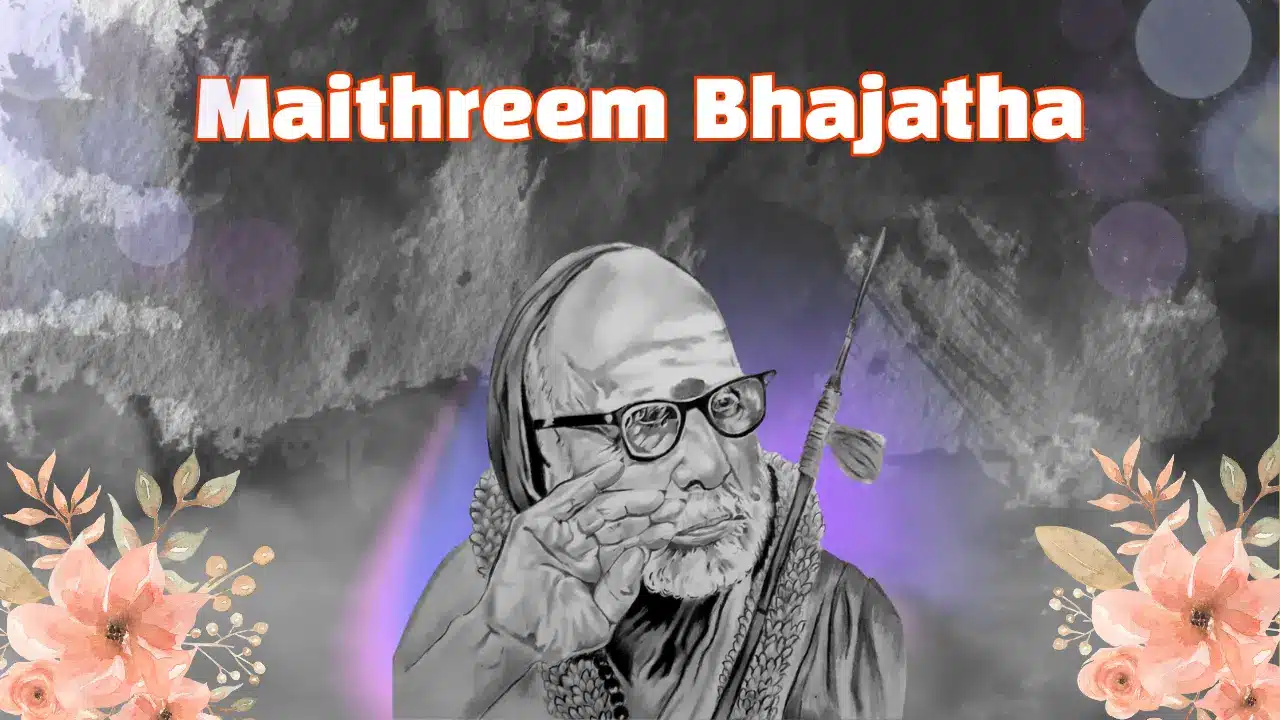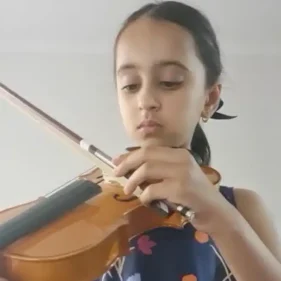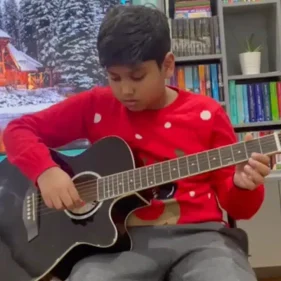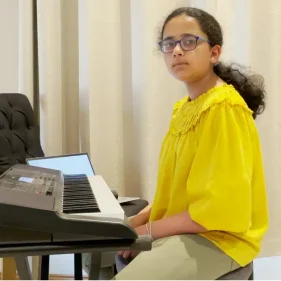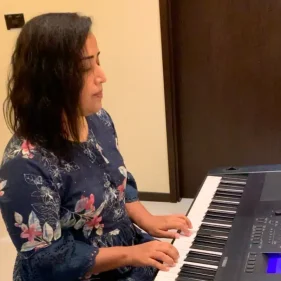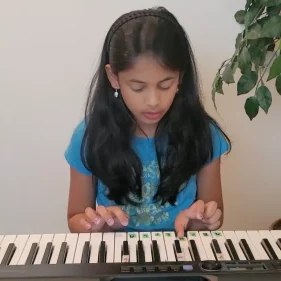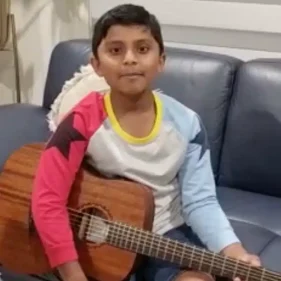- Maithreem Bhajatha and the UN
- Maithreem Bhajatha – a Ragamalika
- Chandrasekharendra Saraswati – Lyricist of Maithreem Bhajatha
- Shri Vasant Desai – composer of Maithreem Bhajatha
- Maithreem Bhajatha Lyrics and Notation
- Maithreem Bhajatha Lyrics: Sanskrit
- Maithreem Bhajatha Lyrics: Transliteration in English
- Maithreem Bhajatha Lyrics Meaning
- Maithreem Bhajatha Summary
- Conclusion
- FAQs
There is no song that unravels the importance of peace, than the melodious, Maithreem Bhajatha, a Sanskrit benediction that put our country on the map. This melodious ragamalika composed by Shri Vasant Desai set in Adi thalam (4/4 rhythm structure in western classical music) is written by the renowned saint, Chandrasekharendra Saraswati, fondly called as Mahaperiyavar and referred as the Parmacharya (translation: the great teacher) of Kanchi Kamakoti Peetam located in Kanchipuram. This song is a celebrated gem in Maithreem Bhajatha history, as it has been a symbol of peace since its inception.
Maithreem Bhajatha and the UN
Like I mentioned in the beginning, Maithreem Bhajatha did add pride to our nation. To put things into perspective, the UN celebrates its annual day of sorts on October 23rd recognising global peace. It also calls renowned artists across the world to showcase their talents with awards and accolades. In its 66th annual function, Bharath Ratna awardee, MS Subbulakshmi , a singer who is still an inspiration to me and many other music enthusiasts worldwide, performed along with Dr. Radha Vishwanathan this song. Moved by the simplicity and divinity of the song, they were applauded with a standing ovation from the entire stadium. This incident traces back to the year 1966. This performance added a glorius chapter to Maithreem Bhajatha history.
Maithreem Bhajatha – a Ragamalika
Any song that is composed in more than one raga is called Ragamalika that roughly translates to a garland made of multiple ragas like colourful flowers. This song is composed in the ragas, Yamunakalyani and Kapi. These both combined forming the structure of Maithreem Bhajatha ragam.
Yamunakalyani: I’m assuming the first half of the raga is named after the river, Yamuna, because when you start performing this janya raga of the 65th Melakarta system, Mechakalyani, it starts flowing seamlessly, which is a a perfect choice for the Maithreem Bhajatha ragam. The scale evokes shingara (beauty), bhakthi (devotion) and veeram (strength) depicting Maithreem Bhajatha right.
Arohanam: s r2 g3 P m2 g3 P d2 n3 d2 S
Avarohanam: S n3 d2 P m2 g3 m1 r2 s
R2 is Chathusruthi Rishabham
G2 is Antara Gandharam
M2 is Prathi Madhyamam
D2 is Chathusruthi Dhaivatham
N2 is Kakali Nishadam
Kapi: This audava-vakra sampoorna raga evokes pathos but with a touch of happiness, like happy tears. The Maithreem Bhajatha ragam of Kapi captures this sentiment perfectly. In a way, it reminds me of my morning coffee where I’m so grateful for it to be the first thing that goes into my system that it tears me up a bit.
Arohanam: s r2 m1 p n3 S
Avarohaṇam: S n2 d2 n2 p m1 g1 r2 s
R2 is Chatusruthi Rishabham
G1 is Saadarana Gantharam
M1 is Suddha Madhyamam
D2 is Chatusruthi Dhaivatham
N2 is Kakali Nishadham
N1 is Kaisiki Nishadham
Chandrasekharendra Saraswati – Lyricist of Maithreem Bhajatha
Born in the late 1800s, Chandrasekharendra Saraswathi, the ardent disciple of Adi Shakaracharya, followed his teachings and propagated to the entire world with his profound knowledge toward humanity. His contribution toward reforming temples, spreading scriptures and improving the pronunciation of vedas by priests of temples has made him a guru of many.
With renowned scholars and kings coming to his simple and practical advises, his discourses are still heard amongst many homes. Every year, drama shows showcasing the gurus of India are performed by renowned artists of the Tamil industry and the Mahaperiva show is one of the main shows that is always ‘Housefull’ packed with people to know his story and his greatness. He had composed Maithreem Bhajatha long back but lent it to Shri Vasant Desai from Maharashtra for the UN convention.
Shri Vasant Desai – composer of Maithreem Bhajatha
Shri Vasant Desai was a famous Indian music composer who was the man behind the tunes of Bolre Pappi Hara (Movie: Guddi), and movies of director Shantaram along with many scores of Marathi films from the 80s era. Interestingly, he was the first one to give Vani Jayaram amma to do her Bollywood debut for Guddi again which is one of my favourites till date. When he visited Kanchi, he was given the opportunity to grace one of his benedictions with a ragamalika for the UN day performed by the Bharat Ratna awardee, MS Subbulakshmi.
Maithreem Bhajatha Lyrics and Notation
Raga : Yamuna Kalyani
Maithreem Bhajatha | , Akhila hrijaythreem ||
G, G,, GM GRR NRG M,GRSS,RG ,
Maithreem Bhajatha | , Akhila hrijaythreem ||
G, G,, GMGRR NRG M,GRS NSRGMPM ,
Maithreem Bhajatha | , Akhila hrijaythreem ||
G, G,, GMGRR NRG M,GRSS,, ,
Athmava Deva Pa | Rana Pi Pashyatha ||
P, M2 G P,P PM2 GMDNR,N D, D P,P, ,
Yuddham Thyajatha | , Spardham Thyajatha ||
D,D,, P D D, N N,, D N N, ,
Yuddham Thyajatha | , Spardham Thyajatha ||
D,D,, P D D, N N,, D N N, , Ṙ Ṡ Ġ Ṁ Ṗ Ḋ Ṅ Ṣ Ṛ G̣ Ṃ P̣ Ḍ Ṇ Ġ
Thyajatha Pareshwa | , Kramama Kramanam ||
ṠṠṠ Ṡ ṠN “DNSN”P, G R G P R S S,, R G
Thyajatha Pareshwa | , Kramama Kramanam ||
ṠṠṠ Ṡ ṠN “DNSN”P, G R G P R S S,, R G
Raga: Kapi
, Janani Prithivi | , Kaamadu ghaasthey ||
R M P N N N N N,, D “N1D” “DP” “PM” R M P D Ṡ N P
, Janani Prithivi | , Kaamadu ghaasthey ||
N N N,, N S N,, D “N1D” “DP” “PM” R M P D Ṡ N P
, Janako Devaha | , Sakala dayaaluhu ||
G2 G2 G2,, G2 M G2 M, R M N1 P G1 R N2 S
, Janako Devaha | , Sakala dayaaluhu ||
G2 G2 G2,, M G2 RG2M G2M R M N1 P G1 R N2 S
,,Damyatha Dattha , Dayadhvvam Janatha ||
R, M P N2, N2, Ṡ N2 S N2 N2, D N2 Ṡ Ṡ ,
,, Damyatha Dattha , Dayadhvvam Janatha ||
R, M P N2, N2, Ṡ N2 S N2 N2, D N2 Ṡ Ṡ ,
Back to yaman Kalyani
,Shreyo Bhooyaath | , Sakala Jananam ||
Ṡ, Ṡ, Ṡ N N, P,, G R G “DP” R, S,,
,Shreyo Bhooyaath | , Sakala Jananam ||
Ṡ , Ṡ, ṠN N, P,, G R G “DP” R, S,,
,Shreyo Bhooyaath | , Shreyo Bhooyaath ||
Ṡ, Ṡ, Ṡ N N, P,, S, S, S N N, P,,
, Shreyo Bhooyaath | , Sakala Jananam ||
Ṡ, Ṡ, Ṡ N N, P,, G R G “DP” R, S,,
, Shreyo Bhooyaath | , Sakala Jananam ||
G, G,, R G G,, P P M2 G P, P,,
, Shreyo Bhooyaath | , Sakala Jananam ||
D, D,, P D D,, M2 D N Ṡ “DN”, N,,
, Shreyo Bhooyaath | , Sakala Jananam ||
Ṡ, D, Ṡ, Ṡ,, N Ṙ Ġ Ṙ Ġ, Ġ,,
Maithreem Bhajatha Lyrics: Sanskrit
मैत्रीम् भजत अखिल हृज्जेत्रीम् (= हृत् जेत्रीम् )
आत्मवदेव परानपि पश्यत (= आत्मवत् एव परान् अपि पश्यत)
युद्धम् त्यजत स्पर्धां त्यजत
त्यजत परेषु परेष्वक्रममाक्रमणम् (=परेषु अक्रम आक्रमणम्) ||
जननी पृथिवी काम दुघास्ते (=दुघा आस्ते)
जनको देवः सकल दयालुः
दाम्यत दत्त दयध्वं जनताः
श्रेयो भूयात् सकल जनानाम् ||
Maithreem Bhajatha Lyrics: Transliteration in English
Verse 1 in Yamuna Kalyani raga
Maithreem Bhajatha , Akhila Hrujjethreem (3)
Aatmavadeva paraanapi pashyatha (2)
Yuddham thyajatha , Spardhaam Tyajata (2)
Thyajatha Pareshu akramamaakramanam (2)
Verse 2 in Kaapi raga
Jananee Pruthivee Kaamadughaastey (2)
JanakO Devah Sakala Dayaaluh (2)
Daamyata Datta Dayadhvam Janathaah (2)
Sreyo Bhooyaath Sakala Janaanaam (5)
Maithreem Bhajatha Lyrics Meaning
The first two lines of maithreem bhajatha lyrics talk about serving the world with friendship Maithreem) and humility that will tend to win the hearts of the world (Akhila).
In the following lines, Paramacharya asks people to look at others as yourself, teaching us the art of humility which will result in (yuddham tyajata) renouncing wars, unnecessary greed for power (Spardhaam) and giving up the obsession over other’s success.
The verse in kaapi tells how the earth gives us everything and asks us to collectively be responsible for a blessed earth.
Jananee Prthivee Kaamadughaastey means the Mother Nature is huge and is always ready to provide us everything we desire like a Kaamadenu a mythological cow from Hinduism which grants wishes and gives everything you ask for.
JanakO Deva: Sakala Dayaalu – Our creator, our father, is known to be compassionate to everyone.
- Daamyata means to restrain yourself.
- Datta means to donate your wealth to the needy.
- Dayathvam means to be kind to other people.
- Janathaa refers to the people of the world.
- Sreyo Bhooyaath Sakala Janaanaam blesses all the people of the world to be happy and prosperous.
Maithreem Bhajatha Summary
The timeless beauty of Maithreem Bhajatha is to make friends and look at the world with kindness while teaching the 3 Da(s) of behaviour for men, gods and humans. Mythology says that the cloud thundered three times when Prajapathi’s sons asked their father to guide them with lessons to lead a peaceful life. It seems that the sons could hear the syllable, ‘Da’ thrice which talks about compassion, self control, and having a charitable mentality. This is also a universal lesson that applies to every being on earth and beyond.
Conclusion
There are many versions of this beautiful composition. The song’s relevance is not limited to the Maithreem Bhajatha Carnatic tradition; it has been rendered by numerous artists around the world. One of the most moving versions was rendered by the singer, Bharawaj Gowtham along with his band, arranged by Prashanth Techno that has a sweet story to be inclusive which I feel is the crux of this song.
Other renditions include a Sudha Ranganathan video where she connected with 47 musicians around the world, a Nandhini Chari acapella, and many Carnatic music concert versions saying only one thing – Blessing the world to be happy and prosperous. This is something that should be spread amongst every age group to make the society more empathetic and tolerable for everyone to live well and equal. This is a overall Maithreem Bhajatha summary , a melody that touching the herats who hears it.
FAQs
What is the meaning of Maithreem Bhajatha?
Maithreem means friendship, bhajatha means to foster. Maithreem Bhajatha simply means to cultivate friendship. The philosophy behind it is to make good friends who will matter for a lifetime.
Who composed Maithreem Bhajatha?
Maithreem Bhajatha was composed by a renowned Indian composer - Shri Vasant Desai who has composed tunes for many Marathi plays, and the heroes of 80s Bollywood industry.
Who sang Maithreem Bhajatha?
Maithreem Bhajatha was sung by many but it became famous after the late Bharat Ratna awardee, MS Subbulakshmi to commemorate the 66th UN Day on October 23rd 1966, recognising global peace.
What is the history of Maithreem Bhajatha?
When the United Nations committee was fishing out for global artists to perform their art on their UN day, Maithreem Bhajatha was performed by the Carnatic prodigy, MS Subbulakshmi which received a standing ovation from the entire stadium.
Where can I find the lyrics of Maithreem Bhajatha?
You can find the lyrics of Maithreem Bhajatha in most of the online forums. Alternatively, you can go through this blog to find out.
How to pronounce Maithreem Bhajatha?
Maithreem Bhajatha is a Sanskrit benediction penned by Mahaperiyava. So it becomes important to pronounce it right. The correct pronunciation is “My-thrim Bha-ja-tha”. One advice I can give you is to write it in your local language and add small pointers or accents to remember it while singing.
Where can I listen to Maithreem Bhajatha?
There are many online platforms to listen to a variety of renditions like YouTube, Spotify, and Amazon Music. Alternatively, you can go to different sabhas this Margazhi season and I’m sure it will be one among the playlist for two reasons - one is the theme to harness world peace and the other is the millions of MS Amma fans across the globe!
What is the message of Maithreem Bhajatha?
The main message that Maithreem Bhajatha conveys is the three Da(s) told by Prajapathi as the lesson to gods, demons and humans. The three Da(s) are immense self-control, be kind using charity and the compassion that one has to have toward their fellow beings and the world.
What are the lyrics of Maithreem Bhajatha in English?
Below are the lyrics of Maithreem Bhajatha transliterated in English language:
Verse 1 in Yamuna Kalyani raga?
Maithreem Bhajatha , Akhila Hrujjethreem (3)
Aatmavadeva paraanapi pashyatha (2)
Yuddham thyajatha , Spardhaam Tyajata (2)
Thyajatha Pareshu akramamaakramanam (2)
Verse 2 in Kaapi raga?
Jananee Pruthivee Kaamadughaastey (2)
JanakO Devah Sakala Dayaaluh (2)
Daamyata Datta Dayadhvam Janathaah (2)
Sreyo Bhooyaath Sakala Janaanaam (5)
Related blog: Theeratha Vilyattu Pillai

